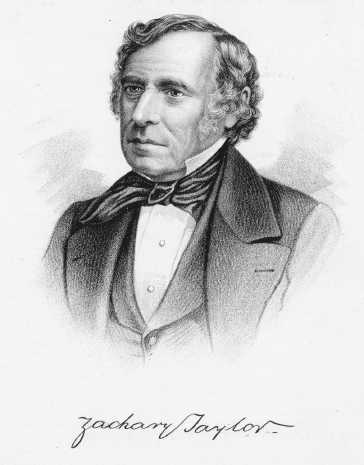64 ZACHARY
TAYLOR.
ZACHARY
TAYLOR.
tellectual stimulus. Thus with him the uneventful
years rolled on. Gradually he rose to the rank of
colonel. In the Black-Hawk war, which resulted in the
capture of that renowned chieftain, Col. Taylor took a
subordinate but a brave and efficient part.
For twenty-four years Col. Taylor
was engaged in the defence of the frontiers, in scenes
so remote, and in employments so obscure, that his
name was unknown beyond the limits of his own
immediate acquaintance. In the year 1836, he was sent
to Florida to compel the Seminole Indians to vacate
that region and retire beyond the Mississippi, as
their chiefs by treaty, had promised they should do.
The services rendered here secured for Col. Taylor the
high appreciation of the Government; and as a reward,
he was elevated to the rank of brigadier-general by
brevet; and soon after, in May, 1838, was appointed to
the chief command of the United States troops in
Florida.
After two years of such wearisome
employment amidst the everglades of the peninsula,
Gen. Taylor obtained, at his own request, a change of
command, and was stationed over the Department of the
Southwest. This field embraced Louisiana, Mississippi,
Alabama and Georgia. Establishing his headquarters at
Fort Jessup, in Louisiana, he removed his family to a
plantation which he purchased, near Baton Rogue. Here
he remained for five years, buried, as it were, from
the world, but faithfully discharging every duty
imposed upon him.
In 1846, Gen. Taylor was sent to
guard the land between the Nueces and Rio Grande, the
latter river being the boundary of Texas, which was
then claimed by the United States. Soon the war with
Mexico was brought on, and at Palo Alto and Resaca de
la Palma, Gen. Taylor won brilliant victories over the
Mexicans. The rank of major-general by brevet was then
conferred upon Gen. Taylor, and his name was received
with enthusiasm almost everywhere in the Nation. Then
came the battles of Monterey and Buena Vista in which
he won signal victories over forces much larger than
he commanded.
His careless habits of dress and his
unaffected simplicity, secured for Gen. Taylor among
his troops, the sobriquet of "Old Rough and
Ready.'
The tidings of the brilliant victory
of Buena Vista spread the wildest enthusiasm over the
country. The name of Gen. Taylor was on every one's
lips. The Whig party decided to take advantage of this
wonderful popularity in bringing forward the
unpolished, unlettered, honest soldier as their
candidate for the Presidency. Gen. Taylor was
astonished at the announcement, and for a time would
not listen to it; declaring that he was not at all
qualified for such an office. So little interest had
he taken in politics that, for forty years, he had not
cast a vote. It was not without chagrin that several
distinguished statesmen who had been long years in the
public service found their claims set aside in behalf
of one whose name had never been heard of, save in
connection with Palo Alto, Resaca de la Palma,
Monterey and Buena Vista. It is said that Daniel
Webster, in his haste remarked, "It is a nomination
not fit to be made."
Gen. Taylor was not an eloquent
speaker nor a fine writer. His friends took possession
of him, and prepared such few communications as it was
needful should be presented to the public. The
popularity of the successful warrior swept the land.
He was triumphantly elected over two opposing
candidates, Gen. Cass and Ex-President Martin Van
Buren. Though he selected an excellent cabinet, the
good old man found himself in a very uncongenial
position, and was, at times, sorely perplexed and
harassed. His mental sufferings were very severe, and
probably tended to hasten his death. The pro-slavery
party was pushing its claims with tireless energy,
expeditions were fitting out to capture Cuba;
California was pleading for admission to the Union,
while slavery stood at the door to bar her out. Gen.
Taylor found the political conflicts in Washington to
be far more trying to the nerves than battles with
Mexicans or Indians.
In the midst of all these troubles,
Gen. Taylor, after he had occupied the Presidential
chair but little over a year, took cold, and after a
brief sickness of but little over five days, died on
the 9th of July, 1850. His last words were, "I am not
afraid to die. I am ready. I have endeavored to do my
duty." He died universally respected and beloved. An
honest, unpretending man, he had been steadily growing
in the affections of the people; and the Nation
bitterly lamented his death.
Gen. Scott, who was thoroughly
acquainted with Gen. Taylor, gave the following
graphic and truthful description of his character,--"
With a good store of common sense, Gen. Taylor's mind
had not been enlarged and refreshed by reading, or
much converse with the world. Rigidity of ideas was
the consequence. The frontiers and small military
posts had been his home. Hence he was quite ignorant
for his rank, and quite bigoted in his ignorance. His
simplicity was child-like, and with innumerable
prejudices, amusing and incorrigible, well suited to
the tender age. Thus, if a man, however respectable,
chanced to wear a coat of an unusual color, or his hat
a little on one side of his bead; or an officer to
leave a corner of his handkerchief dangling from an
outside pocket,--in any such case, this critic held
the offender to be a coxcomb (perhaps something
worse), whom he would not, to use his oft repeated
phrase, 'touch with a pair of tongs.'
"Any allusion to literature beyond
good old Dilworth's spelling-book, on the part of one
wearing a sword, was evidence, with the same judge, of
utter unfitness for heavy marchings and combats. In
short, few men have ever had a more comfortable,
laborsaving contempt for learning of every kind."

